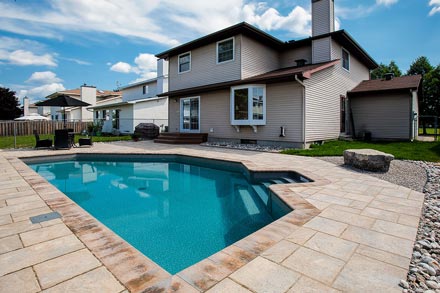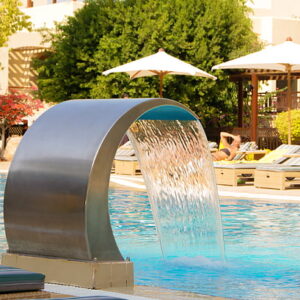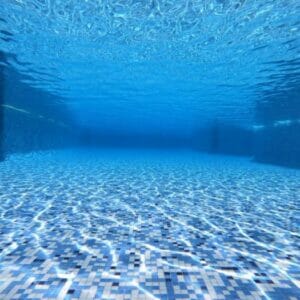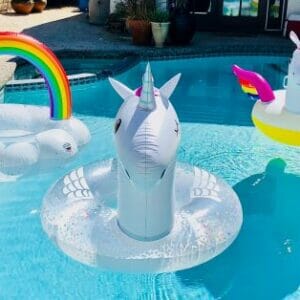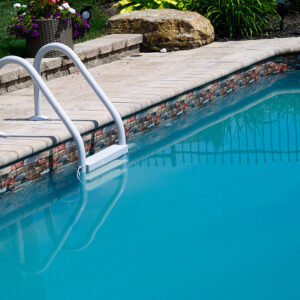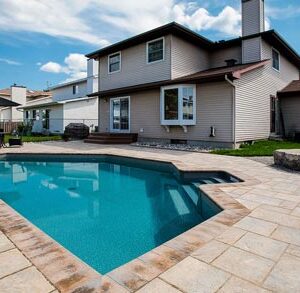How to Increase and Decrease pH and Alkalinity in Your Pool
There is nothing quite like enjoying a dip in your clean, cool pool on a hot summer’s day. But if you don’t have the right type and combination of chemicals in your pool, you could end up with stinging eyes, itchy skin or even an upset stomach.
Keeping your in-ground swimming pool water clean and chemically balanced is important not just for health but to maximize the life of your pool and its mechanical parts too.
Using pool chemicals to balance pH, alkalinity and sanitizer levels will prevent algae and bacterial growth, keep water clear and protect your filters and pumps from damage.
Why and How to Test My Pool Water
Regularly testing the pH and alkalinity levels in your pool water is how you will know whether any chemical adjustment is required. Physical signs of chemical imbalance in your pool include:
- Cloudy water
- Sore eyes and skin
- White scale build-up at water surface
- Etching or scaling on pool walls and deck
- Pump or filters not performing or blocked
If you wait until these signs appear, then it will take more treatment to balance the water, and may even require you to drain and refill your pool. Regular testing will ensure you catch any imbalance early, and can adjust before any serious damage is caused.
Various home pool water testing kits are available on the market which don’t require a chemistry degree to use. The most popular options amongst backyard pool owners include:
Test strips: Strip is dipped into a pool water sample and colour indicates level of each chemical in the water
Liquid tests: Liquid test drops are added to pool water samples and the resulting colour indicates the level of each chemical present.
Digital tests: These range from readers that can accurately interpret the colour results of liquid testing, to machines that can read a water sample directly and provide a digital result.
A more recent addition to the pool water testing market are smart water monitors that continuously read the water, sending alerts to a smartphone app when a level falls out of the acceptable range. See this review of the best smart pool monitoring systems for more information.
Why is Alkalinity Important to My Pool’s Water Balance?
When testing your pool water, Total Alkalinity should be checked before pH levels. Alkalinity in the water prevents extreme pH fluctuations so if alkalinity is out of whack, it will be much harder to balance the pH level.
The ideal range for Total Alkalinity in your pool water is between 80 and 120 parts per million.
Total alkalinity levels can be adjusted using chemical increasers and decreasers. Sodium bicarbonate can also be used to increase alkalinity and sodium bisulphate to reduce it, just make sure to calculate the amount required for the gallons of water in your pool.
Read more about the relationship between pH and alkalinity here.
What pH Level Should My Pool Be and How Can I Adjust It?
The pH level of your pool water refers to how acidic or basic (alkaline) the water is. Anything between 0 and 7 is acidic, while 7-14 is basic. Keeping your pH level balanced will keep your pool comfortable to swim in and protect your pool equipment.
The ideal pH for a swimming pool is 7.4 – 7.6. For comparison, the human body has a pH of around 7.4.
High pH can be caused by the presence of algae, sudden heating of the pool or added sanitizers.
A pH level that is too high can result in:
- Burning eyes and dry, itchy skin
- Scale build-up on walls and pool mechanics.
- Cloudy water and algae build up – because high pH impacts the effectiveness of sanitizer
Treat high pH in pool water by adding sodium bisulfate or muriatic acid to the water. Always follow the manufacturer’s instructions on your chemical treatments and run the pump and filters during treatment.
Low pH can be caused by:
- Leaves and plant waste in the water
- Heavy rain
- High pool use – contaminants from bodies and hair
If the pH level of your pool water is too low, pool surfaces and equipment can become etched and corroded.
Low pH can be adjusted by adding an alkaline such as soda ash (sodium bicarbonate) or borax. Aerating the water with a water feature can also help. Always follow the instructions to ensure you are adding the correct ratio of chemicals for the amount of water in your pool.
What Else Do I Need to Test and Treat For Healthy Pool Water?
There are other chemical levels that also need to be checked and adjusted to keep your pool water balanced and healthy, with arguably the most important being sanitizer.
Common sanitizers used in backyard pools are chlorine and bromine. They keep your pool water free of bacteria, viruses and algae through oxidation or ionization.
Chlorine levels should be between 1 and 3 parts per million. Chlorine levels can fall fast, especially if there is heavy use of the pool. Sun can also burn away chlorine quickly, so it needs replacing faster on hotter days.
Chlorine or other sanitizers are available as:
- Liquid: Diluted and poured directly into pool
- Granules: Placed into the filter to be distributed as water circulates
- Tablets: Which can be added to a floating or automatic dispenser
Many sanitizers have stabilizers added to help slow the degrading effects of sunlight. Cyanuric acid can also be added for this purpose.
Shocking Your Pool
Shock treatments are used to boost sanitizer levels that have dropped extremely low. A high dose of liquid chlorine is added and allowed to circulate for a few hours to bring levels up.
How Often Should I Test My In-Ground Pool Water?
The level of sanitizer in your pool can be checked using the same methods above.
Sanitizer levels should be tested every day and adjusted as required. Total Alkalinity and pH should be tested at least 2 – 3 times a week, but more frequently if there has been heavy use or a rain storm.
Enjoy the Summer in a New In-Ground Pool from Jordco Pools
As you can see, it is important to test your pool water regularly so you can keep having fun all through the pool season.
Jordco Pools designs and installs in-ground pools throughout the Ottawa region and can help guide new pool owners as to the correct chemical testing and adjusting routine for their size and type of pool. Contact us today to start planning your new Ottawa backyard pool install.

